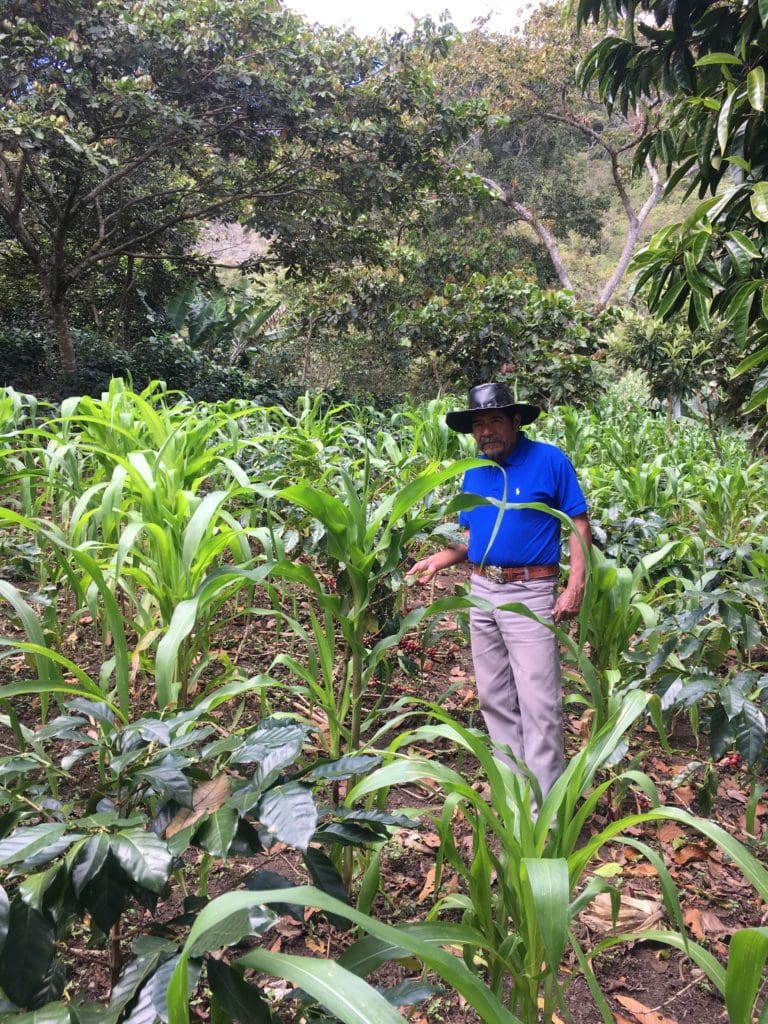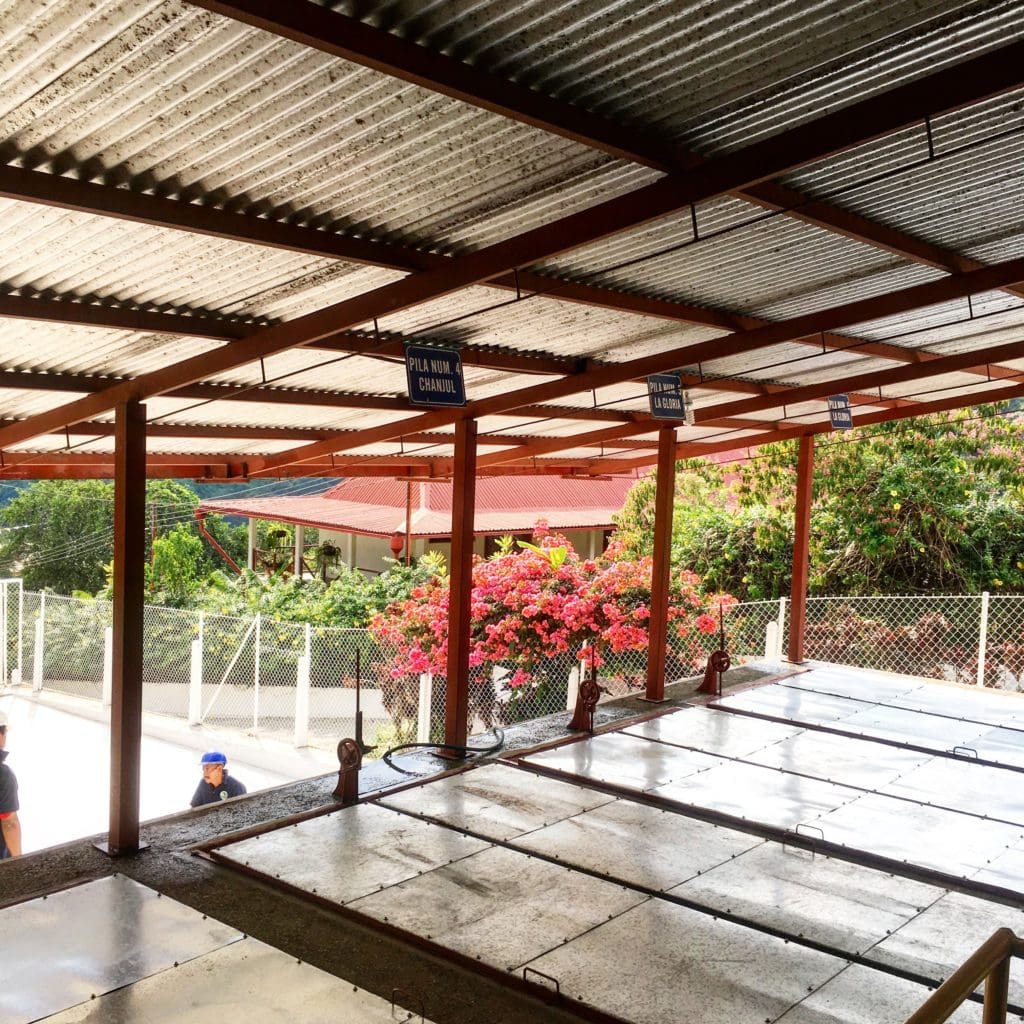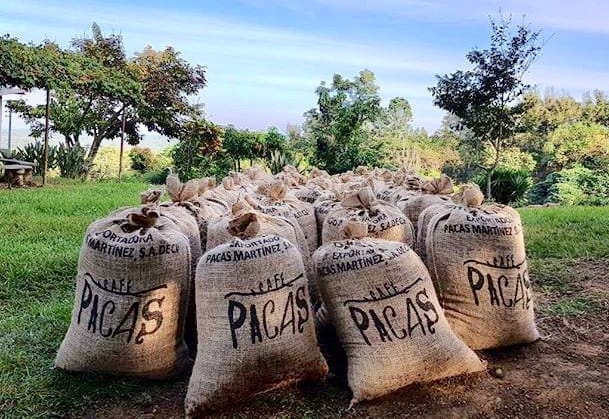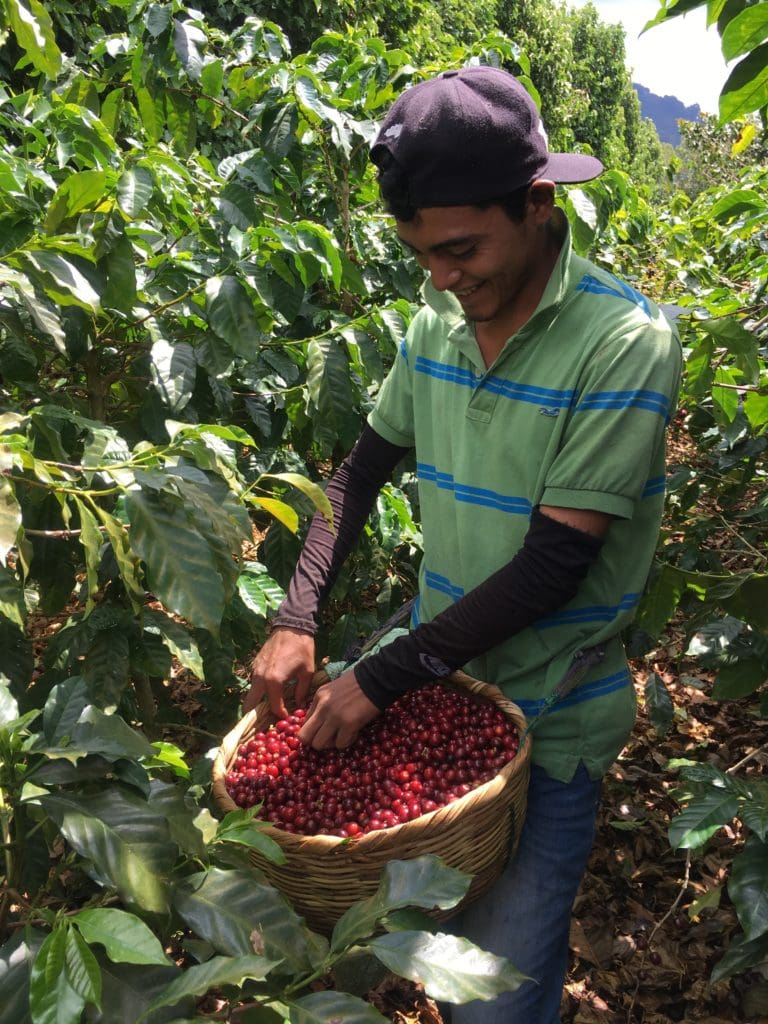In February, we took our annual trip to El Salvador and Mexico. Some of these coffees have just arrived and others will be here soon, so we thought it was a great time to give you the full lowdown on our travels and what we saw this year.
We began our trip in Chiapas, Mexico visiting producers near San Cristóbal de las Casas. In this area, we work with several producer organizations that are associated with NKG’s Mexican office, Exportadora Café California (ECC). Coffee growing regions in this area have been under stress since Roya hit back in 2012. Since then, producer organizations have been working diligently to renovate their lands. In 2014, ECC developed a program called Por Mas Café, which aims to assist small producers with their agricultural needs. There are currently over 500,000 producers enrolled and the program gives micro-financing through a national agriculture bank where producers can take interest free loans for four years. Four years gives farmers the opportunity to renovate their entire farm at once, or in ¼ hectare increments if they choose. This is also an adequate period of time for them to generate new production with increased yields. Most farmers who enrolled in the program immediately after Roya hit were producing an average of 3 quintales/hectare, and have since increased their yields to over 25 quintales/hectare in the subsequent years. Por mas café also provides producers with new plants, fertilizer and technical assistance to not only produce coffee, but many other crops for internal consumption and trade. They have planted over 27 million coffee trees since 2014, mostly of Obata, Costa Rica 95, Marseillesa, H1, Sarchimor, and Oro Azteca. An added environmental benefit is that instead of using traditional black plastic wrapping to house and transport trees while they are in the nursery, ECC uses a completely biodegradable material called Eco-pil. This allows trees to be planted in their bags and has eliminated many millions of plastic casings.
Next, we traveled several hours south to Tapachula to visit Cafetelera Guadalupe Zaju (CGZ). CGZ is a group of three farms that are part of the Aida Batlle Selection of Mexican coffees. Finca Guadalupe, Finca Chanjul and Finca La Gloria all reside about a two hour drive from Tapachula. These farms took new ownership in 2004, one year before Hurricane Stan flooded and decimated the area. Since then, the farms have been renovated and replanted twice - once after the hurricane, and again after the Roya outbreak in 2011/12. Together, the farms total over 500 acres of pristine land, much of which has been set aside as forest preserve, while Bourbon, Marsellesa, Star Maya, Hybrids and Caturra are the primary varieties in production. In total, 200 hectares are producing coffee. Finca Guadalupe Zaju houses both the wet and dry mill and serves as the centralized point of milling for all farms. The wet mill was very well designed with multiple enclosed fermentation tanks for processing day lots. An adjacent warehouse next door serves as large area for stacked raised drying beds. The warehouse was designed with a retractable roof, which can be open or closed depending on weather and processing needs. They process much of their coffees washed and are also specializing in honey and natural processes. We look forward to seeing what is to come from these farms and the ABS program in the coming years.
Next, we traveled by plane to El Salvador to visit many of our producer friends, celebrating both old and new relationships. El Salvador, although a small producer by size, has a very diverse range of coffee varieties. Harvesting roughly 1% of what Brazil does, the country produced nearly ¾ million bags this year. Specialty coffee accounts for approximately 65% of its total exports, and that figure is expected to rise to 80% by 2025, according to the Salvadoran Coffee Council. El Salvador has had one of the most rapidly changing landscapes in Central America since the worst Roya outbreak on record ravaged the region in 2012/13. El Salvador was among the hardest hit, and many producers are still in the recovery period.
Our first stop was to Beneficio El Manzano, owned and managed by Emilio Lopez Diaz. Emilio and his team have been undergoing heavy renovations since 2013, and in the last two years have begun to reap the benefits of their hard work. They have added new horizontal dryers, giving them a total of six and allowing them to get coffee into the warehouses and move through production cupping at a faster rate, as well as exporting containers speedily. They have also added a new line to their wet processing facility, which has allowed them to move through de-pulping in about half the time as previous years. Much of Finca El Manzano has been planted with Caturra and Pacas, as well as SL 28 and Gesha which are truly shining. Emilio and his team took both first and second place this year at the 2018 El Salvador COE for their SL28 and Gesha lots, respectively, and we are darn proud of their accomplishment.
Following our visit with Emilio and his team, we headed to visit their neighbor and our long-term producer friends, Café Pacas. Finca La Esperanza is a favorite among several of our clients and Maria Pacas has had the good fortune of pre-selling most of it’s production directly to her clients over the last decade. At Esperanza, the Pacas family is working on a variety classification project, with the goal of continuing their path of genetic discovery and ideally finding varieties that are resistant to disease, while also yielding the quality customers are seeking. Additionally, the Pacas were able to exceed their production projections for the year, as their production/hectare continues to be on the rise with the renovations they have done. This year they produced over 8,000 bags of coffee.
Next up was another visit with Aida Batlle, who has four of her own revered farms (most notably Finca Kilimanjaro) and she also sources exceptional coffees from other farmers under the Aida Batlle Selection. The region of Santa Ana was hit with very hard winds storms this year. Moreover, Roya made another disruptive appearance and it, coupled with the winds, made for an especially challenging harvest. Despite both setbacks, Aida's yields and qualities were very similar to past years, due to the very careful monitoring and farm management during pre-harvest and throughout the season. She plans to continue to invest heavily in the farms by pruning, replanting, fertilizing, renovating and spraying against Roya. Aida has garnered quite a demand for her coffees over the last decade, and while many of these are pre-sold, she still keeps lots aside for developing new relationships with emerging roasters, which we think is pretty cool.
We concluded our trip visiting the Mendez family in Ataco, Ahuachapán, with whom we've been working with closely for nearly a decade. Coincidentally, I had the amazing opportunity to live on one of their farms (Finca Talnamica) for over two years as a Peace Corps volunteer during 2009-2011. While we have historically managed all of these coffees as pre-sold, we are so excited to feature the Mendez's coffee from Finca Natamaya for the very first time on our offer list this year. Grown on the slopes of Cerro El Aguila, this farm is comprised of mostly heriloom Bourbon, with small amounts of Pacamara and Gesha. The farm is heavily shaded which allows for extra slow ripening of the coffee cherries and a truly unique cup. The Mendez family delivers their coffee to two wet mills (Sicafe and El Borbollon) who each specialize in various forms of processing. We saw great qualities from both wet mills this year, and look forward to their Natamaya lot, which will hit the west coast offer list in July!



